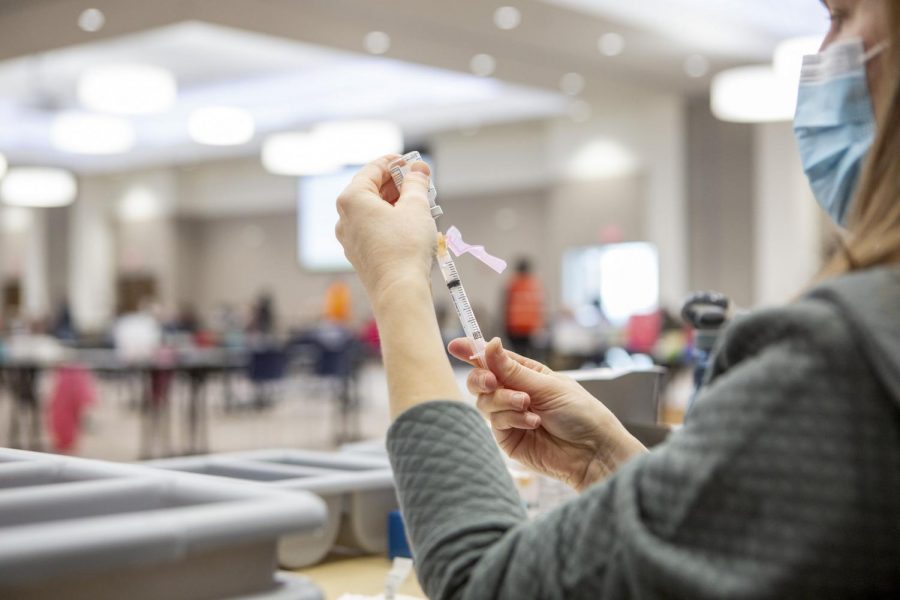Delta, third dose, modeling, more: Experts talk return to campus, COVID-19
A woman fills up a syringe with a Moderna Vaccine at the I Hotel and Conference Center on Feb. 11. With a return to campus health officials expect a rise in cases and what that looks like for the University.
Aug 26, 2021
As thousands of students are returning to campus this fall, one thing is clear: we can expect an increase in COVID-19 cases.
To public health officials who are already seeing an increase in cases — likely due to the Delta variant surge — this comes as no surprise.
“Generally speaking, when you are anticipating tens of thousands of new people coming into a community, there will be cases,” said Awais Vaid, deputy administrator and epidemiologist at the Champaign-Urbana Public Health District. “I mean, there’s no doubt about that.”
Rebecca Smith, epidemiologist and member of the COVID-19 SHIELD team, says it’s hard to predict exactly how many cases to expect due to many unknowns.
For one thing, there’s not yet data on the vaccination status of all individuals returning to campus. Furthermore, vaccinated individuals who contract the virus tend to have fewer symptoms and as a result are less likely to get tested.
Get The Daily Illini in your inbox!
The Delta variant
A total of 2,413 cases of the Delta variant have been reported in Illinois as of Friday, according to the Illinois Department of Public Health.
“Admittedly, Delta is much more concerning, with the way it spreads,” Vaid said.
This is because B.1.617.2 is much more contagious than previous variants; it spreads quickly and to a lot more people.
The upside?
Champaign County has ample vaccines, and the majority of the campus community is vaccinated with both doses.
University’s vaccination requirement
This fall, all campus members are required to be vaccinated if able to do so. For those who are unable, participation in the on-campus COVID-19 testing program is a requirement.
According to Vaid, a majority of students returning to campus are expected to be fully vaccinated by the time they arrive.
Smith stresses that although vaccination protects individuals from severe disease, it does not fully protect against infection, especially with the Delta variant.
According to Smith, other college campuses are now seeing cases of clusters among fully vaccinated people after gatherings.
“The goal was never to eliminate COVID because we know that that’s not something that is going to be possible once it has spread globally,” Vaid said.
Rather, the goal has always been to limit the spread and ensure the virus is not causing hospitalizations and deaths in infected individuals.
“And that’s exactly what the vaccine does,” Vaid said.
A third dose
On Aug. 13, the Centers for Disease Control and Prevention recommended individuals who have moderate to severe immunocompromised systems receive a third dose of the vaccine.
The recommendation was based on the fact that immunocompromised people do not have as robust of an immune response to the vaccine.
The exact same vaccine as the first two doses, the point of a third dose is to improve immunity among the immunocompromised.
About 3% of the population in Champaign County is eligible for a third dose.
“The number is pretty small and so I’m not expecting a significant surge in the demand for the vaccine of a third dose,” Vaid said.
A revised model
Last fall, the University made national news after an unexpected upswing in cases resulted in a lockdown. The problem? Students continued going out even after testing positive, disregarding public health guidelines and University protocol.
“Once we realized what was happening, we instituted a number of interventions that really helped people get isolated safely and quickly and all of those will still be in place,” Smith said.
The team implemented a texting protocol called SHIELD TEAM 30. Students get a text within 30 minutes of testing positive, informing them about expectations and helping them isolate.
“We worked a lot on just the backend, the boring data and infrastructure pieces so that we can find problems sooner and respond to them faster,” Smith said. “So hopefully, especially compared to last fall, we have a better sense of what to do and how to do it on just the monitoring end and data analysis side, and that just speeds up our response.”
In-person classes
The University is returning to a largely in-person format for classes this fall, attracting students back to campus.
“The CDC, the state, the federal government have emphasized the importance of in-person learning,” Vaid said. “So, that cannot be discounted.”
Smith hopes that SHIELD can respond faster to COVID-19 cases this fall, and the spread of the virus won’t get to the point that it’s necessary to shut down in-person learning for the sake of public health.
“We’ve got a lot more targeted risk-based responses now that we have a better sense of what’s going on and how to respond,” Smith said.
The underlying message from public health experts? Get vaccinated if possible and mask up.
“For the sake of having a fun return to campus without having to isolate, be careful about wearing your masks and avoiding indoor gatherings,” Smith said.






